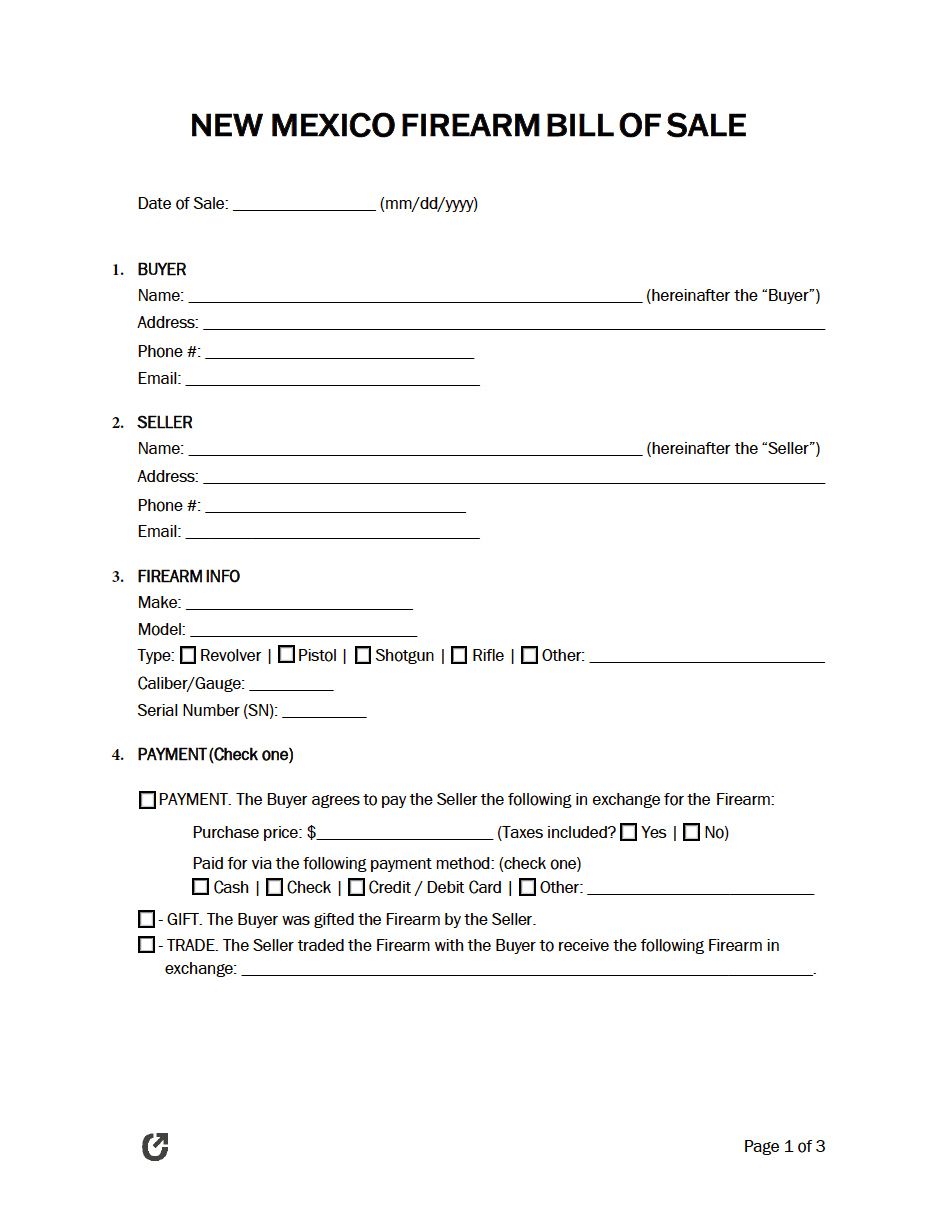New Mexico Firearm Bill of Sale Form
A New Mexico firearm bill of sale form provides evidence of a sale transaction between two parties and serves as a testimony for the ownership transfer of an item or property. The seller gives ownership rights to the buyer, who takes full responsibility for the weapons. By signing the form, the transferor warrants that they legally own the guns, free of encumbrances, liens, and other claims of possession or title. The transferee also agrees that they will provide the seller with payment in the listed amount, comply with all relevant laws and regulations relating to the purchase and ownership of the gun(s), and hold the seller harmless from all claims relating to the firearm possession and transfer.
|
What is a New Mexico Gun Bill of Sale?
A New Mexico gun bill of sale ensures the legal transfer of a weapon between two (2) individuals. It recaps the transfer, including the date, purchase price, and the gun’s description, and supplies both parties with a transaction log. Additionally, it gives the buyer a permanent receipt, allowing them to prove they own the firearm if a dispute happens. The bill of sale also serves as a deterrent against fraud since it creates a paper trail that officials can use to trace the item back to the seller.
How to Apply for a Concealed Handgun License
Residents must have a handgun license to open or concealed carry. The New Mexico Department of Public Safety (NMDPS) LERB Concealed Carry Unit (CCU) handles the processing and issuance of concealed carry licenses. All gun owners can only carry in authorized areas regardless of permit status. The state restricts carrying in schools, universities, preschools, courts (without the judge’s consent), tribal land, public buses, airport security zones, specific federal properties, and posted private property.
Individuals can only carry one (1) concealed handgun on their body at a time. It is illegal to carry additional firearms unless in a vehicle or nearby location and not physically on the person. In addition, they cannot carry (open or concealed) while drinking or under the influence of illegal or legal drugs. Weapon holders do not need a concealed handgun license in the state. However, if they do not, they must always have the loaded gun in a visible holster (i.e., open carry). In other words, they cannot legally carry a concealed firearm upon exiting their property or vehicle.
Step 1 – Qualifiers
The applicant must be legally able to possess a firearm or ammunition, meaning they:
- Do not have felony convictions or other crimes resulting in a prison sentence for longer than a year;
- Are not a fugitive from justice;
- Are not illegally using or addicted to any controlled substance;
- Have not been deemed mentally defective or required to reside in any mental institution; and/or
- Are not illegal aliens.
Step 2 – Firearms Training
Before applying for a concealed handgun license, residents must pass a firearms training course. After completing the class taught by an NMDPS-approved instructor, students receive a signed certification. The state requires the individual to present the certificate during their appointment as notice of their training. Trainees must take a refresher course every two (2) years to maintain their education status and/or handgun license if approved.
Step 3 – Appointment
Interested parties must make an appointment with a CCU office to provide the required forms and payment. On the day of the meeting, they must have the documents ready, or the state can deny them.
| Bring the Following: |
Step 4 – Processing
The CCU has thirty (30) days after receiving the application to conduct a background investigation, which can take up to ninety (90) days. Therefore, processing can take up to 120 days. Individuals who wish to know their application status can contact the CCU by telephone at (505) 841-8053. The inquirer can only receive the details if they provide personal information, such as their address, social security number, and date of birth.
If approved, the license will arrive in the mail. Denied applicants can contest the notice, depending on the reason. For example, a person who has a criminal charge cannot reapply because they cannot legally have a concealed weapon. However, someone who did not input the correct information may be able to reapply.
Step 5 – Renewal
New Mexico handgun licenses expire four (4) years after the issue date. Military, LEO, and RLEO permits last five (5) years. Individuals who receive suspensions or revocations during this period cannot legally concealed carry. Instead, they must pay the fines or adhere to the penalties before re-establishing their license status (if possible).
To keep their license, residents must take a two (2) hour refresher requirement course two (2) years after receiving it. After completing the online course, the results electronically send to the CCU, which files them. The student does not receive a copy of this certification. When renewing their permit after four (4) years, they must take a separate four (4) hour class. The classes keep individuals up to date on gun laws and safety.
License holders must also visit a CCU office to provide a completed renewal form, payment, proof of a completed firearms refresher course, driver’s license, and fingerprints (only if not previously on file). They can turn in the paperwork up to sixty (60) days before expiration or sixty (60) days after. If the individual submits it after the expiration date, they cannot use the license until they renew.
| Mailing Address: |
| 6301 Indian School Road NE Suite 310 Albuquerque, NM 87110 |
